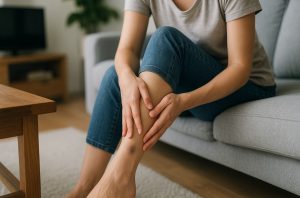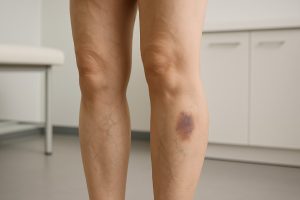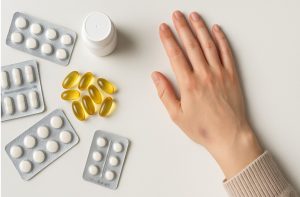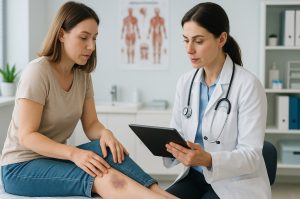What Makes Women Notice Random Bruises on Their Legs?
Have you ever looked down at your legs and spotted a dark patch of skin without any memory of an injury? Many women experience this, and it can often be puzzling or even concerning. Bruises, or haematomas, are usually caused by a knock or bump, yet sometimes they seem to appear without reason.
A bruise forms when tiny blood vessels under the skin break and leak blood into the surrounding tissue. The trapped blood creates discolouration that changes over time from reddish or purplish tones to green and yellow as the body repairs the damage.
While most bruises heal within two weeks, unexplained or frequent bruises on the legs can raise questions about what is really going on beneath the skin.
For females, random bruises may be linked to everyday knocks, but there are also wider influences such as age, hormones, nutrition, circulation, and even underlying health conditions. Understanding these factors helps to separate harmless bruises from those that may need medical attention.
Why Do Minor Bumps Sometimes Cause Noticeable Bruises?

The legs are one of the most common places for bruises to appear because they are more exposed to knocks and pressures in daily life. Walking into furniture, carrying shopping bags, or even vigorous exercise can create enough impact to damage blood vessels beneath the skin.
Interestingly, not all bumps cause visible bruises. The extent of bruising depends on several factors, such as the strength of blood vessels, skin thickness, and how quickly the body forms clots to stop bleeding.
Women with more delicate skin or naturally fragile vessels are more likely to see bruises from small incidents they may not even recall.
How Does Ageing Influence Bruising on the Legs?
As women age, their skin becomes thinner and loses the protective layer of fat that normally cushions blood vessels. This natural ageing process means that vessels sit closer to the surface and are more vulnerable to breaking. Even light pressure or minor trauma can cause bruising in older women.
Another aspect of ageing involves the gradual weakening of blood vessels. Reduced elasticity makes them more likely to rupture.
Sun damage accumulated over years can add to this fragility, particularly in women with lighter skin tones. As a result, bruises tend to appear more frequently and may linger for longer compared to those in younger women.
Do Hormonal Changes Contribute to Easy Bruising?
Hormones play a crucial role in vascular health, and fluctuations in oestrogen levels can have a marked effect on bruising. Oestrogen supports collagen production, which strengthens blood vessel walls. When levels drop, such as during menopause, the vessel walls may weaken, leading to easier bruising.
During pregnancy, hormonal changes can also make blood vessels more sensitive. Similarly, women who use hormonal contraceptives may notice they bruise more easily than before.
Menstrual cycles can create temporary changes in vascular stability as well. These patterns highlight how closely the female hormonal system is tied to bruising tendencies.
Can Circulatory Problems and Varicose Veins Cause Leg Bruises?

Circulatory health is another important factor in bruising. When blood flow is not efficient, the legs are particularly affected because they carry the weight of the body and are furthest from the heart.
Varicose veins are a common circulatory issue that can contribute to bruising. They occur when valves in the veins do not work properly, allowing blood to pool instead of flowing smoothly.
This increased pressure weakens vessel walls, making them prone to bursting and leaving visible bruises. Women with varicose veins may also experience itching, heaviness, or swelling in the legs.
Even without varicose veins, general circulatory problems can delay the healing of bruises, making them more visible for longer periods.
Do Genetic Factors Make Some Women Bruise More Easily?
Genetics influence how strong or fragile a person’s blood vessels are. If close family members bruise easily or have conditions such as varicose veins or clotting problems, the likelihood of experiencing frequent bruising is higher.
Inherited clotting disorders, although relatively rare, can also be passed down through families. These conditions affect how the blood clots and can lead to unexplained or prolonged bruising. In these cases, family history often provides an important clue when doctors investigate frequent or severe bruising.
Which Medications and Supplements Increase Bruising?

Several medications, and even some herbal supplements, can increase bruising by affecting blood clotting. Blood thinners such as warfarin and aspirin are common examples, as they reduce the blood’s ability to clot quickly.
Corticosteroids, when used over long periods, thin the skin and make blood vessels more fragile, leading to easier bruising.
Even some natural supplements have blood-thinning properties. Ginkgo biloba, fish oil, and vitamin E are well-known for this effect. While they may benefit circulation or heart health, they can also increase the risk of unexplained bruises, especially when combined with prescription medicines.
How Do Vitamin Deficiencies Influence Bruising?
Nutritional health is closely tied to bruising. Deficiencies in certain vitamins and minerals can weaken blood vessels or impair the clotting process.
- Vitamin C deficiency reduces collagen production, making vessels fragile and prone to breaking.
- Vitamin K deficiency affects the body’s ability to form clots, leading to larger or prolonged bruises.
- Iron deficiency causes anaemia, reducing the oxygen supply to tissues and delaying healing.
Women with restrictive diets, poor absorption issues, or heavy menstrual bleeding may be at greater risk of these deficiencies.
Can Weak Blood Vessels Lead to Bruises Without Injury?
Yes, weakened vessels can rupture even without noticeable trauma. For example, women may find bruises on their legs after waking up, caused by pressure from sleep positions. Similarly, standing for long periods may create enough stress on already weakened vessels to result in bruising.
Underlying conditions such as varicose veins or chronic circulatory issues increase this risk. When the structural support of the vessels is compromised, even small amounts of pressure can cause them to leak.
When Should Women Seek Medical Advice About Bruising?

Most bruises are harmless and fade within a couple of weeks. However, there are circumstances where medical advice should be sought. Frequent bruises without explanation, unusually large bruises, or bruises that persist for several weeks may signal an underlying problem.
If bruising is accompanied by other symptoms such as nosebleeds, gum bleeding, blood in the urine or stool, or persistent fatigue, it may indicate a clotting disorder or another systemic condition. In such cases, professional evaluation is important.
What Serious Health Conditions Can Easy Bruising Indicate?
Occasionally, unexplained bruising may be a sign of a more serious medical condition. Bleeding disorders such as haemophilia or Von Willebrand disease affect the blood’s ability to clot. Liver disease, which disrupts the production of clotting factors, can also cause bruising.
Autoimmune conditions that attack or inflame blood vessels may make them more fragile. In rare cases, certain cancers such as leukaemia interfere with bone marrow function, leading to abnormal bruising.
While these conditions are not the most common causes, unexplained bruising should not be ignored if it is frequent or severe.
When Does Unexplained Bruising Become Dangerous?
Most random bruises are harmless, but certain warning signs suggest the need for urgent medical review. Bruises that appear with persistent pain, swelling, or the formation of hard lumps should not be dismissed.
Darkening of bruises into black or brown patches, or the appearance of unexplained bleeding elsewhere in the body, also raises concern.
In some cases, unexplained bruising may point to circulatory problems such as deep vein thrombosis, which can be life-threatening if left untreated.
How Can Unexplained Bruises on Legs Be Treated or Managed?
Treatment depends on the cause. For varicose veins or poor circulation, compression stockings can improve blood flow and reduce the risk of vessel rupture. Lifestyle changes such as regular exercise, balanced diet, and avoiding long periods of inactivity also strengthen circulation and help prevent bruising.
Nutritional deficiencies can be corrected through diet or supplements. For example, increasing intake of Vitamin C through citrus fruits and peppers, or Vitamin K through leafy greens, can strengthen vessels and clotting ability.
If medications are contributing to bruising, doctors may review prescriptions and adjust dosages. Medical treatments for varicose veins, such as sclerotherapy or laser therapy, can also help improve circulation and reduce bruising.
How Do the Main Causes of Bruising Compare?
| Cause | Underlying Factor | Typical Features | Management Approach |
| Ageing & Hormonal Changes | Thinning skin, reduced oestrogen | Frequent small bruises, slow healing | Hormone balance, skin protection |
| Circulatory Issues | Varicose veins, poor blood flow | Bruises with heaviness, itching | Compression, exercise |
| Medications & Supplements | Blood thinners, corticosteroids | Larger bruises from minor knocks | Doctor review |
| Vitamin Deficiencies | Lack of C, K, iron | Slow healing, fatigue, more bruises | Dietary support |
| Serious Health Conditions | Clotting disorders, liver disease, autoimmune conditions | Severe or persistent bruising | Medical treatment |
FAQs About Random Bruises on Women’s Legs
Can hormonal changes make bruising worse during menopause?
Yes. Falling oestrogen levels reduce collagen and weaken vessel walls, making bruises more frequent and slower to heal.
Does having varicose veins increase bruising on the legs?
Yes. Varicose veins increase pressure inside vessels, making them more fragile and prone to rupturing.
Can supplements cause bruising?
Certain supplements like fish oil, vitamin E, and Ginkgo biloba thin the blood slightly, increasing the risk of bruises.
Is bruising linked to liver health?
Yes. The liver produces clotting factors. Liver disease can impair this process, resulting in unexplained bruises.
Do older women heal from bruises more slowly?
Yes. With thinner skin and reduced elasticity of vessels, bruises in older women may take longer to fade.
Can autoimmune conditions cause unexplained bruises?
Yes. Autoimmune diseases can damage or inflame vessels, increasing susceptibility to bruising.
When should a bruise be considered serious?
If bruises are large, painful, slow to heal, or appear alongside other bleeding symptoms, they should be evaluated by a doctor.






